Born on April 12, 1965, in Montreal, Canada, Paul Dillett grew up with a diverse heritage – a French father and a Jamaican mother.
An initially active child, Paul Dillett excelled in football, showcasing promising talent in the Canadian Football League (CFL).
However, his journey took an unexpected turn as his passion for building a formidable physique gradually eclipsed his football aspirations.
The catalyst for Paul Dillett’s journey into bodybuilding was his admiration for figures like Tony Atlas and Rocky Johnson.
Fueled by the desire to emulate their impressive physiques, Paul Dillett transitioned from football to weightlifting. This decision marked the inception of his bodybuilding odyssey.
Paul Dellitt Body Measurements

| Paul Dillett Nickname | The King, Freak-Einstein |
| Paul Dillett Off-Season Weight | 320 lbs (145 KG) |
| Paul Dillett Competition Weight | 285 lbs (129 KG) |
| Paul Dillett Height | 6′ 1″ (185 CM) |
| Paul Dillett Date of Birth | April 12, 1965 |
| Paul Dillett Age | 50 Years |
| Paul Dillett Residence | Toronto, Ontario |
Paul Dillett Bodybuilding Career
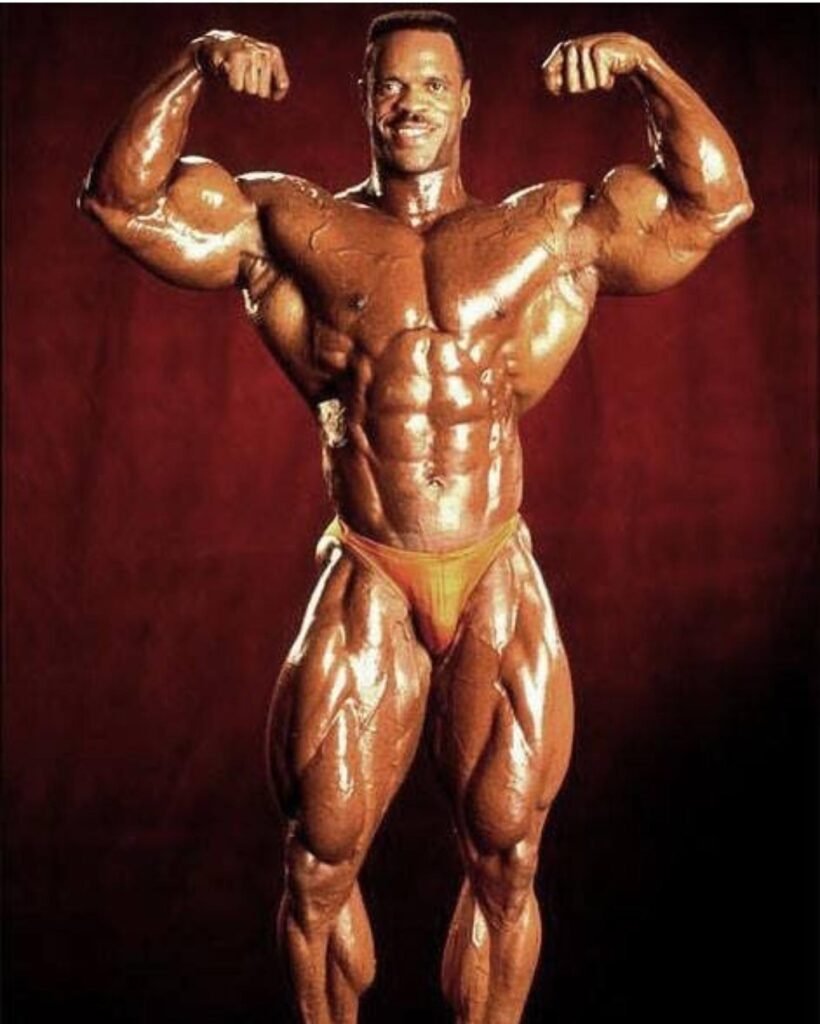
In 1991, Paul Dillett made waves at the North American Championships, securing second place in the heavyweight category.
Undeterred, he returned the following year, clinching the overall championship and earning his IFBB Pro Card.
Professional Debut:
Paul Dillett’s professional debut occurred at the 1993 Arnold Classic, where he secured a commendable fourth place.
His Olympia debut in the same year surprised many, attaining a sixth-place finish.
Health Scare and Absence:
The year 1994 marked a turning point for Paul Dillett. His ambitious pursuit of the Arnold Classic trophy led to a severe health scare, collapsing on stage due to extreme dehydration.
Despite a brief legal death, Paul Dillett survived, attributing the incident to excessive calcium intake and misplaced advice.
Impact on Long-Term Health:
The health scare left a lasting impact on Paul Dillett’s long-term health and performance. He admitted to never fully recovering and avoiding diuretics afterward.
Despite these challenges, Paul Dillett continued competing for over a decade, participating in 29 pro bodybuilding shows.
Career After Health Scare:
After taking 1995 off to recover, Paul Dillett made a strong comeback in 1996 with podium finishes at the Arnold Classic and Czech Republic Grand Prix.
His career peaked with a victory at the 1999 Night of Champions and top-five finishes at the Olympia in 1996 and 1997.
Final Years and Retirement:
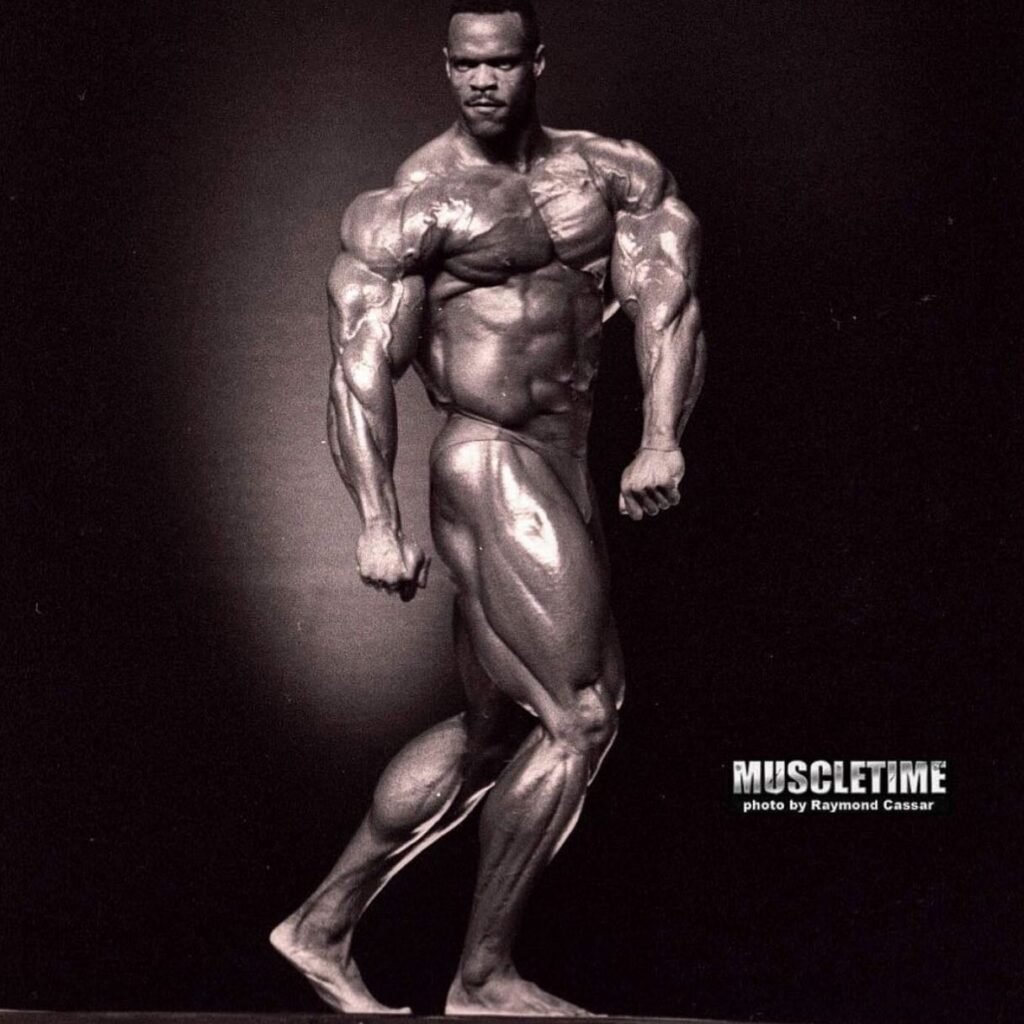
Paul Dillett’s final professional appearance was at the 2006 Montreal Pro, securing a tenth-place finish.
Although he didn’t formally announce his retirement until 2012, his impact on bodybuilding remained indelible.
Paul Dillett’s journey in bodybuilding exemplifies resilience, determination, and the pursuit of excellence despite facing substantial challenges.
His towering physique and enduring spirit have left an enduring legacy in the annals of bodybuilding history.
Paul Dillett’s Diet Plan
Paul Dillett, a towering figure in the world of bodybuilding, attributed a significant part of his success to a straightforward and practical approach to his diet.
Unlike some of his peers who delved into complex nutritional methods, Paul Dillett adhered to a basic yet effective mix of protein, carbohydrates, and fats.
Let’s delve into the key components of Paul Dillett’s diet plan:

Protein Sources
- Chicken: A staple in Paul Dillett’s diet, chicken provided him with a lean source of protein essential for muscle development and recovery.
- Egg Whites: Known for their high protein content, egg whites contributed to Paul Dillett’s daily protein intake, promoting muscle growth.
- Fish: Rich in omega-3 fatty acids and high-quality protein, fish, particularly varieties like salmon, complemented Paul Dillett’s nutritional regimen.
- Lean Cuts of Steak: Red meat, in the form of lean steak cuts, supplied additional protein and essential nutrients for sustained energy.
Carbohydrates
- Brown Rice: A complex carbohydrate, brown rice served as a primary source of energy, supporting Paul Dillett’s intense workout sessions.
- Potatoes: With their moderate glycemic index, potatoes provide a steady release of energy, crucial for a bodybuilder’s demanding training routine.
- Oats: Oats, a versatile whole grain, contribute fiber and carbohydrates, aiding in overall digestive health and sustained energy levels.
Fats
- Olive Oil: Paul Dillett incorporated olive oil into his diet as a source of healthy monounsaturated fats, promoting cardiovascular health.
- Egg Yolk: While focusing on egg whites for protein, Paul Dillett recognized the importance of healthy fats in egg yolks, adding variety to his diet.
- Nuts: Nuts, such as almonds or walnuts, supply essential fats, vitamins, and minerals, supporting overall health and well-being.
Paul Dillett Supplements
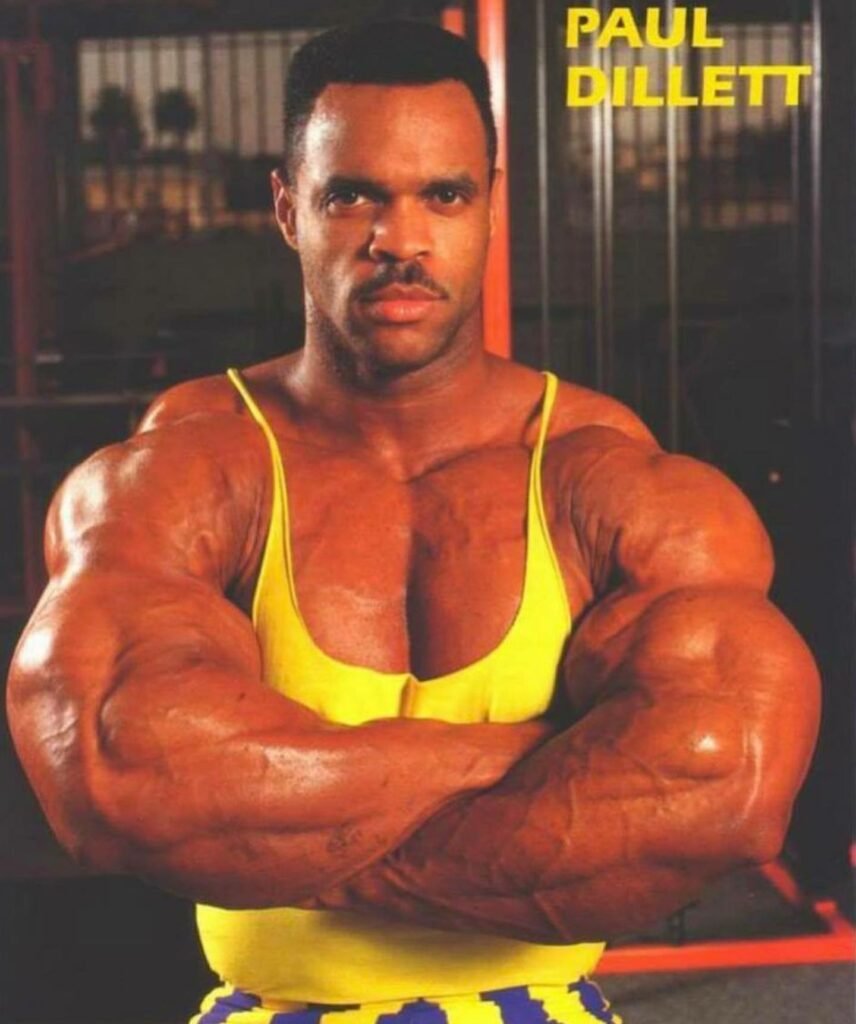
- Whey Protein: A constant in Paul Dillett’s dietary regimen, whey protein served as a convenient and efficient way to meet his protein requirements.
- Multivitamins: During competition preparation phases when caloric intake was restricted, Paul Dillett supplemented with multivitamins to ensure adequate micronutrient levels.
- Fish Oils: Recognizing the benefits of omega-3 fatty acids, Paul Dillett included fish oil supplements for their positive impact on heart health.
- Fat Burners: Limited to competition preparation phases, fat burners were part of Paul Dillett’s strategy to fine-tune his physique for the stage.
Paul Dillett’s nutritional philosophy was grounded in simplicity. His adherence to fundamental foods like rice, chicken, and steak, coupled with strategic supplementation, reflected a pragmatic and sustainable approach to fueling his body for the rigorous demands of professional bodybuilding.
In his own words, “I keep it very basic. Nothing fancy, rice and chicken, and I throw in a couple of steaks in there. Everyone knows that I drink a lot I am a shake guy.”
This simplicity played a pivotal role in sustaining Paul Dillett’s physique and performance throughout his illustrious career.
Paul Dillett’s Intensive Workout Routine
Paul Dillett, famously known as the “mass monster” of the 1990s, sculpted his imposing physique through an intense and strategic workout routine.
Despite not exceeding 260 to 265 lbs during his career, Paul Dillett’s proportions and muscle fullness created a visual illusion, earning him widespread recognition.

Let’s delve into the details of Paul Dillett’s workout regimen that contributed to his legendary status in the bodybuilding world.
Paul Dillett Training Schedule
Paul Dillett adhered to a rigorous training schedule, often working out twice a day and incorporating cardio sessions.
His dedication was evident in his routine, where he prioritized both cardiovascular health and targeted muscle development.
Paul Dillett Morning Cardio
- Time: 6:30 AM
- Type: Fasted Cardio
- Duration: Not specified
Paul Dillett First Weight Training Session
- Start Time: 12:30 PM
- Focus: Full-body workout emphasizing major muscle groups
- Duration: Not specified
Rest Period
- Duration: 3-4 hours of rest after the first workout
Second Weight Training Session
- Focus: Smaller muscle groups (arms, calves, lower back, hamstrings)
- Time: After the rest period
- Followed by:Intense cardio session
Paul Dillett Training Philosophy
Paul Dillett’s training philosophy revolves around consistency, dedication, and adaptation.
He was not fixated on the free weight vs machine debate but acknowledged the potential harm caused by free weight movements.
Paul Dillett observed the evolution of exercise machines, emphasizing their role in minimizing injuries and long-term hazards associated with training.
Perception of Hard Work
Contrary to narratives suggesting he was a genetically gifted bodybuilder who didn’t work hard, Paul Dillett debunked such claims.
He highlighted his commitment to early morning and late-night cardio sessions, training twice a day, dismissing the notion of being a “lazy chair.”
Paul Dillett Cardiovascular Training
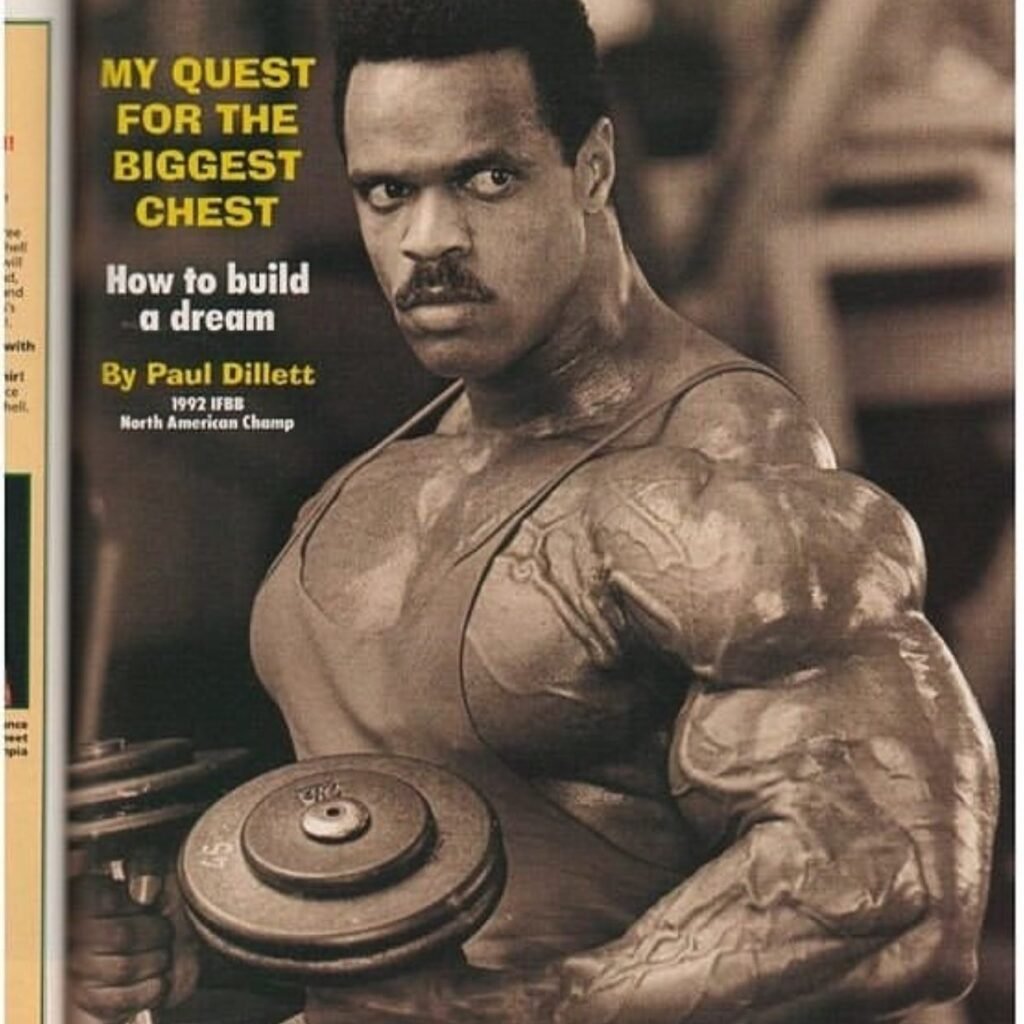
Paul Dillett’s extensive cardio routine set him apart in an era where some bodybuilders feared muscle loss associated with prolonged cardiovascular activity.
He embraced cardio as a vital component, allocating significant time to treadmill and bike workouts.
Even during competition preparation, Paul Dillett engaged in two hours or more of cardio daily, challenging the conventional belief of muscle loss during extended cardiovascular sessions.
Paul Dillett Training Split
Paul Dillett structured his training split differently from the traditional weekly model.
His approach involved a four-day consecutive training cycle, followed by a day off, and then repeating the four-day split.
During competition preparation, he modified the routine to three consecutive training days, a rest day, and then repeating the three-day cycle.
This adjusted frequency of rest days is aimed at accelerating recovery and minimizing the risk of injuries or training fatigue.
Paul Dillett Off-Season Training Split
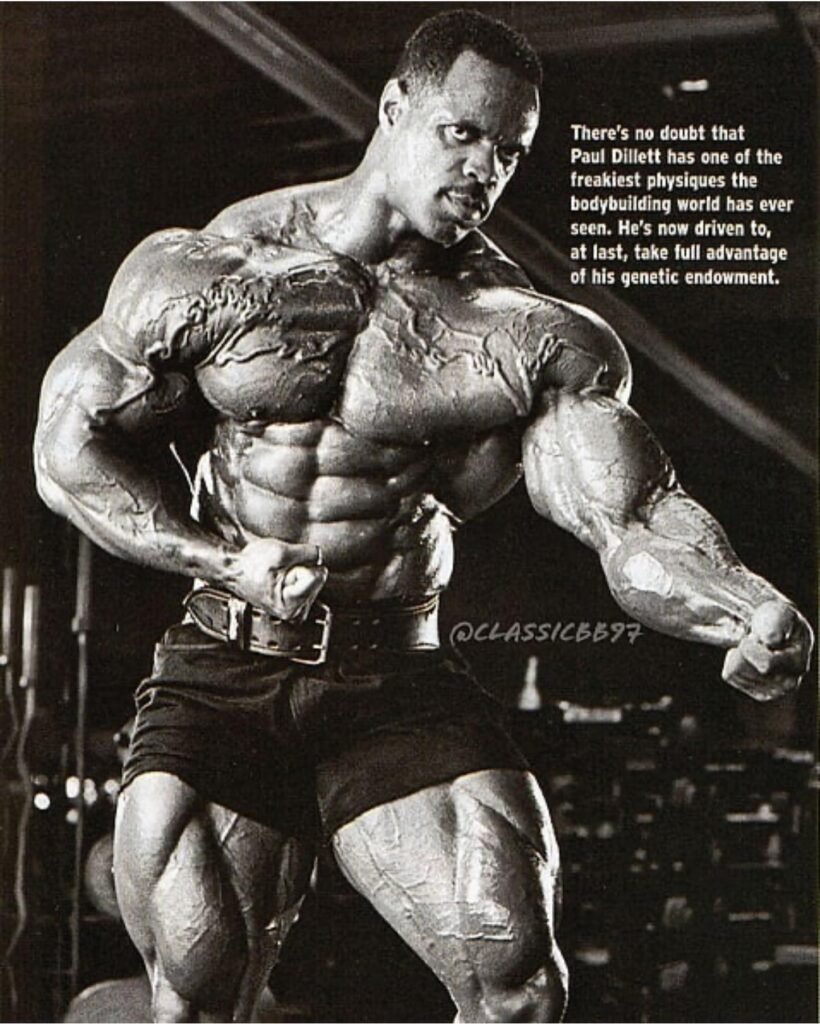
| Day 1 | Shoulders |
| Day 2 | Quads (Morning) and Hamstrings (Evening) |
| Day 3 | Chest (Morning) and Arms (Evening) |
| Day 4 | Back |
| Day 5 | Rest |
| Day 6 | Repeat the Cycle |
Paul Dillett’s dedication to his unique training routine, coupled with an open-minded approach to evolving training methodologies, played a pivotal role in his successful bodybuilding career.
His ability to adapt, focus on cardiovascular health, and emphasize consistency in training showcased a holistic approach that contributed to his status as a mass monster and a respected figure in the bodybuilding community.